|
This article is part of an on-going series exploring the history of Eastern Prince Edward Island. The locations and people detailed below can be explored more fully as a part of the cultural tours which we offer. See our main page for more information. This article was inspired and assisted through the photos and stories found in Bonnie Townshend's book, "The Road to Fortune"; a book which contains a plethora of stories, photos, and memories. We thank Bonnie for her hard work and research. 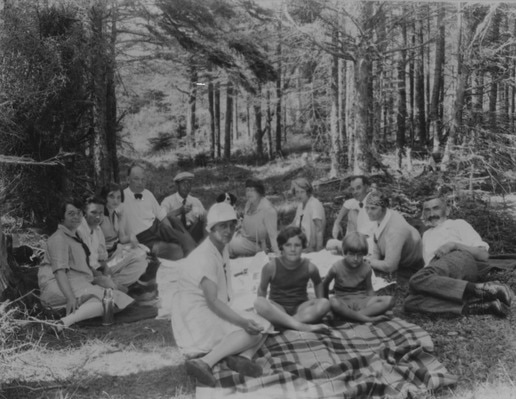 A picnicking crowd in Fortune, circa 1928. A picnicking crowd in Fortune, circa 1928. Bay Fortune, it seems, has had its fair share of fame and celebrity in its past, stretching all the way back to the infamous case of Pearce and Abel. But Fortune’s connections to such memorable moments in history are not merely a thing of the past, for they live on today in the remaining artifacts and stories which the colorful characters who once called the area home have left behind. Previous editions of this blog have touched upon the curious case of Captain Kidd’s treasure, an article which highlighted its connection to another part of the area’s history, namely the Actor’s Colony at Bay Fortune. It may still be remarked upon as a puzzling development as to how this Colony came to be, for despite the beauty of the Bay it was a long and distant journey for these American “colonists” to find their way here. But as Peake writes, Fortune “was a perfect retreat for these actors, actresses and writers of the American stage who required the renewal of peace and tranquility” (2). Better yet, to quote a contemporary of this colony, a Mr. Charles Flockton, of whom you will soon become familiar, “Abells Cape, situated at the mouth of Fortune River, was at that time a charming old world spot… from the high cliff of red sandstone on which it stood, a narrow path wound its way down to a somewhat delapidated wharf in the immediate foreground. There the local fishermen moored their boats, stowed gear and dried their nets" (1). "Whether this more or less romantic background was responsible for the attraction the Cape possessed for thespians, one can only conjecture. The fact remains however, that many veterans of the stage were to be encountered there, or in its immediate vicinity, summer after summer" (1). Such is no doubt true, and in fact it is this very notion of retreat and solace which continues to draw visitors to the area today. Establishing a Colony In order to uncover the specific genesis of this Colony, we would be remiss to overlook Charles Coughlan, for it is the case that this story too begins (and seemingly ends) with him. Charles Coughlan was initially brought to the Island after seeing a leaflet advertising it in New York. He was an avid sports fisher, and this led him eventually to Fortune, where he was immediately smitten by the place. There was, at this time, already extant a small cottage on Abel’s Cape, as is alluded to above, one which he rented immediately and spent the summer in with his wife and daughter. By the conclusion of the summer he was so enamored with Bay Fortune that he purchased the “Cape House” outright (1). The next summer, with tales of the wonderful Island alight in his mind, Coughlan returned to Fortune, having extended invitations to many of his theatrical friends, thus laying the groundwork for the future actor’s colony (3). Attracted by Coughlan’s own residence, C.P. Flockton soon followed him to Fortune and purchased three different properties in the Fortune area.  A turn of the century sketch of the "Cape House", as it appeared in the Prince Edward Island Magazine. A turn of the century sketch of the "Cape House", as it appeared in the Prince Edward Island Magazine. Charles P. Flockton and the Flockton Comedy Company For while Coughlan was the progenitor of the Actor’s Colony, it was surely Flockton who brought it to life, making it the prosperous summer settlement that it became, as without him it would never have been. Flockton, or “Flockie” as he was known by his friends at the time, was an amiable and sociable character, who had risen to prominence first in England, and then in New York City. It is said that Oscar Wilde wanted Flockton to be in his first play, “Vera the Nihilist”, and he was noted as being “among the best stock actors in America" (4). Jessie Millward, in his 1923 book “Myself and Others”, remembered Flockie as “a dear old English gentleman who bore the most extraordinary likeness to [Henry] Irving. Indeed he always vowed that he had been compelled to leave England because Irving was so like him. A most lovable and quaint personality" (4). 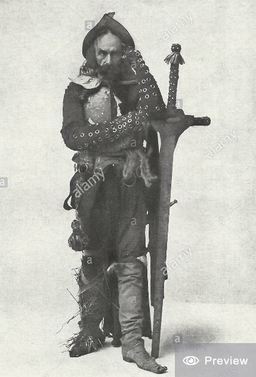 Flockton in costume, performing "An Enemy of the King". Flockton in costume, performing "An Enemy of the King". Under Flockton, the colony was truly something to be remarked upon. It became an intricate collection of cottages and houses rented by some of the most notable actors of the American east coast. Further pamphlets were printed to attract others, highlighting some of the features of the area. This included an illustration of what is now known as Fortune Back Beach, under the name of “Sea Gull Beach”, and advertised trout fishing, deep sea fishing, and sun bathing, as well as row boats for hire and a schooner, the “Stroller”, for rent, permitting his guests to go sailing (5). Things were not always utopic under Flockton’s lead at the Colony however. For reasons not entirely known (although Carrington offers much conjecture in the way of booze), Flockie and the Actors often found themselves falling upon hard times. Not unlike the extant trope of the done-hard-by actor, proper planning for meals, sustenance, and amenities often went by the wayside, resulting in sometimes dire situations. As Carrington recounts, “every sort of domestic essential was lacking, even food. Of that only a small quantity remained - tea, bread, butter, potatoes; of linen, crockery, cutlery, and kitchen utensils there were practically none.” This would have been tolerable for the small crowd which was staying at the Colony, but as luck would have it, the schooner “Stroller” arrived that night, bearing a multitude of weary and hungry guests, all desperate for sustenance. Given that Flockie’s credit had already been exhausted at Prowse Bros. store, they were uncertain where they should turn (1). Then sprung to their minds the very notion of bountiful trout which had in the first place drawn Coughlan to the area. Warwick and Carrington, both armed with a fishing rod, set out to feed the masses, but upon their return it was found that their “few” fish were hardly enough to feed twelve hungry boarders. The next morning this uppity crowd, fresh from the haute-couture scene of New York and Boston life, found themselves scavenging the rocks of the harbour in search of breakfast. Their effort was rewarded with no fewer than 50 small lobsters, supplemented by several flounders which some of the more talented actors managed to spear. As Carrington recalled at the time, they were no better off than the Swiss Family Robinson (1). 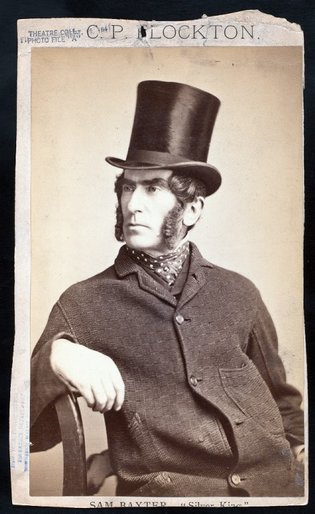 A portrait of Flockton. (NYU Archives). A portrait of Flockton. (NYU Archives). What salvation these fishes were, they did not last long, and a desperate sense of starvation fell upon them all once more. It was then that the idea was hatched to retrieve seagull eggs from the aforementioned Sea Gull Beach, an idea which at the time was met with great gusto. Upon storming the beach the castaways discovered not merely seagull eggs, but the delicacy of plover eggs, such as were fit for royalty. Spirits were elevated on high as the eggs were carried home, spirits not to be broken until a proclamation of “rotten” rained tragedy upon those gathered, perhaps fittingly so (1). Sustenance and survival came only at the eleventh hour when, through some miracle of fate or fortune, credit was re-established at the local store, permitting those gathered to eat, as Carrington recalls, “at almost regular intervals.” It may be seen that the ultimate fate of the Flockton Comedy Company was foretold in the earlier proclamation of the plover eggs. Carrington explains that there were two successful performances in Souris, “after which began the decline and fall of the Flockton Comedy Company. Four one-night stands, all unprofitable, brought us to Charlottetown, the capital and our Waterloo. Our first night's performance in that delightful little city realized some 30 dollars. Of the entertainment itself let us be charitable and preserve a discreet silence. It was stigmatized by one native as "chronic."” This itself was painful, but not fatal. The following night yielded only nine paying patrons. By the last night, the played to an empty theatre (1). That proved to be the final call for the Flockton Comedy Company, which disbanded a few nights later. Flockie was compelled to mortgage his property (yet again) in order to finance passage back to America for his compatriots. This he did, although it was later discovered that such paltry tickets did not include “such trivial items as meals” (1). Were it not for the kindness of those others onboard, it is certain that the destitute company would have starved. As for Flockton, he had but little life left within him. He died only a few years later, in 1904, on a train on his way to California, at the age of 76. It had been his final wishes to have his remains cremated and his ashes spread upon Abel’s Cape, where he had enjoyed his halcyon days. This wish was carried out by the husband of Kate Claxton, and over his ashes was erected a sundial, bearing the phrase, “the timely shadow marks another hour in your absence” (1)(6). The sundial remains to this day, and on this subject Millward adds that “the natives [of Bay Fortune] always vowed that the dead actor's ghost "walked" upon these cliffs. “If it did,” he concludes, “ I'm sure it would never have harmed anybody” (6). 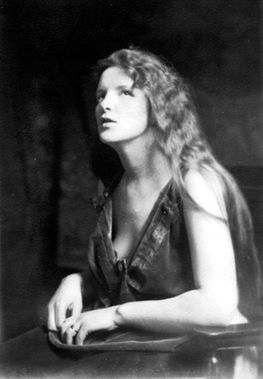 An early promotional photo of Elsa Warwick, circa 1905. An early promotional photo of Elsa Warwick, circa 1905. Meet the Warwicks One of the most notable actors at the colony was Mr. Henry Warwick (often known as Harry), who came to Fortune with his wife Elsa in the late 1800s. Henry was an American actor, while Elsa was originally from Stockholm, Sweden. They were initially guests of C.P. Flockton, but before the turn of the century they had acquired property in the area and built a summer home. At this time Henry belonged to the Vitagraph Company of New York, and Elsa had been a Gibson Girl, and a dancer (5). In the early 1900s Henry found himself acting in numerous silent and sound films, including “The Cheat”, “Red Hot Romance” and “The Witness for the Defense”. From 1917-1931 he acted in 15 different films. Warwick also tried his hand at script writing, drafting the story “Three Knaves and a Heathen Chinee”, which later went on to become a motion picture. Henry quickly grew to love his home in Fortune, and just prior to the year 1900, he had opted to remain for the winter, as did a few of the other Actors. Carrington relates a story from that winter, one that is worth repeating here. It was the case that "one bitterly cold mid-winter night, with a blizzard "beginning to make," Henry happened to notice a complete absence of smoke from Cooper's (his neighbour's) chimney. In such a temperature this had very serious implications, leaving him no choice but to investigate (1). 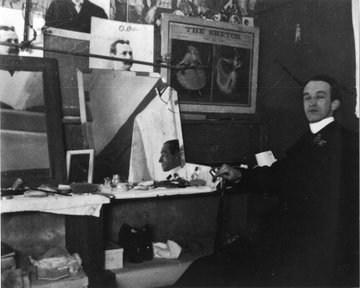 A young Henry Warwick in his studio. (PEIPA) A young Henry Warwick in his studio. (PEIPA) "Through the deep snow he reached Cooper's place, pushed the door open and entered the kitchen. Poor old Cooper lay slumped over an extinct stove, blue with cold and quite unconscious. A coil of rope hung at the back of the door, and taking this down Harry made a couple of loops, which he passed under Cooper's arms. Then, with considerable difficulty, he managed to get the old man on his shoulders and out into the night. "All this took time. Meanwhile the blizzard had started in earnest, indeed had become formidable. Visibility was lowered to such an extent that only by following the fence could Harry find his way home. At last, almost exhausted, he reached his door. Laying Cooper on the day-bed he proceeded to render what aid he could. Fortunately plenty of whisky was available. Forcing a good stiff glass-full between Cooper's teeth, he covered him up with rugs, made up the fire and retired for the night. "Next morning Cooper seemed little the worse for his brush with the Enemy. In fact he dismissed the whole affair as a mere incident - didn't realize, in all probability, what an exceedingly close shave he had had. "But a few winters later brought the tragic finale: a farmer, happening to notice an unfamiliar mound of snow on one of his fields and thinking perhaps some "critter" might have perished and be lying there, kicked the snow away to find, to his amazement, Coopie. This time relief had come too late. Coopie's little moment of sleep, borrowed from death, had been repaid in full." Despite such occurrences the Warwicks developed a strong attraction to the area, and during Henry’s time as a prominent actor, Elsa found herself more and more drawn to the Island. It proved to be an inevitable affliction, and it didn’t take long before she opted to live in Fortune year round. By 1900, Elsa had moved to Bay Fortune permanently. When Henry retired from acting he joined his wife in Fortune, and the two lived the remainder of their lives there (5). 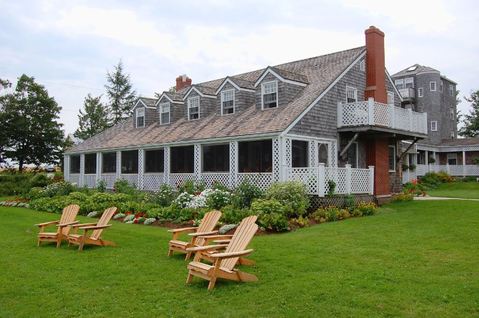 Harris' summer home still stands today, and is now the Inn at Bay Fortune. Harris' summer home still stands today, and is now the Inn at Bay Fortune. Elmer Harris and the Inn at Bay Fortune As was noted in The Guardian in 1918, Elmer Harris was well known at that time as a “celebrated author and playwright from New York" (7). And while this undoubtedly earned him a certain degree of respect in the Fortune area, it is not always this that he is remembered for, but instead as the owner of “the largest and most beautiful summer home on the river, on which he has spent thousands, and continues to improve and add to from year to year” (3)(7). Mr. Harris was no stranger to the Bay Fortune area around the turn of the century, having been persuaded to visit the area by Flockton. In little time Harris had soon fell in love with it, and in 1908 he bought a piece of property overlooking the Fortune river, and set about the construction of his summer residence, a residence that would one day become the Inn at Bay Fortune. Just as it is today, Harris’ cottage was a magnificent accomplishment, one which elicited fanfare and admiration from all of those in connection with it. An anonymous letter to the editor of The Guardian, written in September of 1918, and signed only by the pseudonym “Angler”, relates to us that this spectacular home rests upon the most charming of sites, and is, in fact, one of the most extensive modern summer homes in Eastern Canada. To the contemporary reader’s favor, this letter-writer tells us that the home featured a water tower, baths, and hot and cold running water throughout. He also indicates to us that the home was by no means finished, and, as we have read above, received ongoing upgrades and renovations on a yearly basis (7). Another curious tale developed in regards to Harris’ cottage, and in particular to the tower. It is said that during the war-time era of World War II, from aloft in the tower on the property one was able to spy military vessels and submarines out in the Northumberland Strait, and that on one occasion, through some method of signalling, communication was established between the tower and a vessel at sea (8). Not long after construction of his cottage, Harris was married in 1913 to Willamino Hennessey. They had two children together, and once these children were grown both he and his wife moved to the Island permanently in the 1950s. 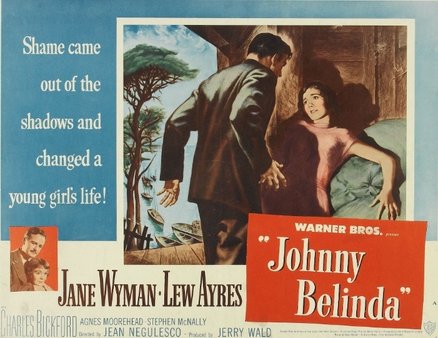 Movie poster for Harris' "Johnny Belinda" Movie poster for Harris' "Johnny Belinda" It was also around this time that Harris wrote the script for “Johnny Belinda”, the play that would go on to be one of his most famous. Telling the story of Johnny Belinda, based upon the real life of Lydia Dingwell, of Dingwells Mills, the plot delves into the complexities of rape and innocence in early Canadian life. The title resonates to this day through the naming of Johnny Belinda Creek, on Route 2 in Dingwells Mills (5). After the illness and death of his wife, the property changed hands several times, before being sold to Colleen Dewhurst, an actress who performed with John Wayne, and who was famously known for her role as Marilla Cuthbert in the movie versions of Anne of Green Gables. Dewhurst and her family summered at the Harris property for many years, enjoying the beauty of Bay Fortune. In 1989 the property was purchased by David Wilmer, who began the process of converting the property into an Inn. It is through process that the Inn at Bay Fortune came into existence, and its current owners, Michael and Chastity Smith, have upheld its historic tradition and fortitude. They have developed the property into not only a world-renowned attraction, but into a living piece of local history, one which beautifully upholds the spirit and tradition of the Bay Fortune’s Actor’s Colony; a history which continues to be written to this day. 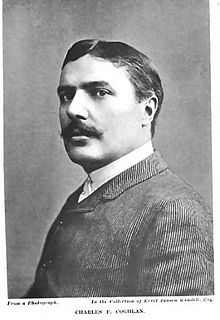 A headshot of Coughlan in his heyday. A headshot of Coughlan in his heyday. Coughlan's Return But to finish this tale, and to return in a way to its origins, we direct our attention once more to the Colony’s initiator, Mr. Coughlan. An actor and playwright, Coughlan was born in Paris to Irish parents, and studied acting there, making his stage debut in 1859 as a minor player. As his career developed he later performed in London, playing in a series of increasingly prominent roles. He made his American debut in 1876 in Bulwer-Lytton's Money at Daly's New York theatre. It was not long after this time that Coughlan arrived in Fortune, and it was in Fortune that he penned two plays: “Lady Barter” and “The Royal Box”. Coughlan’s life was, by all accounts, a thrilling and successful one, as throughout his adult career he continued to split his time between Bay Fortune and the United States, working in the States and relaxing on the Island. He even rose to a fair degree of fame and renown during his lifetime, but it is the case, oddly enough, that his greatest fame was to be found after his death. In his living years Charles had had some interest in what his death might look like, and it is reported that he once visited a fortune teller who told him that his final resting place would one day be the shores of Prince Edward Island. Such a prediction did not seem out of the question, given his affinity for the province, but fate would soon prove that nothing is ever as simple as it seems. 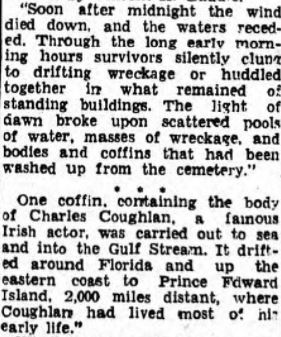 Coverage of Coughlan's "homing coffin", as it appeared in The Guardian on 26 July 1950. Coverage of Coughlan's "homing coffin", as it appeared in The Guardian on 26 July 1950. In his later years he had been acting in Galveston, Texas, when he suddenly fell ill in the Autumn of 1899. Within a month’s time he was dead, and the question then arose as to where to bury his remains. Initially it had been determined that he would be buried in Bay Fortune, but pressure from various acquaintances led officials to determine that his remains would be sent to New York. In the mean time his body had been placed temporarily in the Galveston cemetery. The decision however proved to be a moot one. Before any action could be taken to move the body, the great Galveston Hurricane of 1900 struck, decimating the cemetery. Many graves were destroyed or washed away, Coughlan’s included. The destruction of this sacred ground, coupled with a multitude of missing bodies, made news headlines across the United States. When Coughlan’s body was still listed as missing several years later, the New York Actor’s Club offered a reward for its safe recovery (10). None came forward with a reward, and so the story of Coughlan’s coffin was forgotten, that is, until a discovery was made upon the shores of Bay Fortune. Some local fishermen, hauling in their catch of the day, were startled to discover that they had snared something else in their lines. The weight was enormous, and as they pulled it up into their boat they were shocked to discover that it was a coffin. It was a macabre sight to say the least, but what was most astonishing was the name engraved upon the weathered and beaten placard: Charles Coughlan. It was a stunning discovery, one that was only amplified by the remembrance of the fortune teller’s prediction; come hell or high water, Coughlan had made his way home to the shores of Prince Edward Island, travelling eight years and 2 000 miles, just as had been predicted (12). A Note Regarding This Story: It appears that as this story has been told and retold throughout the years, that much has been added and much has been missing. What can be said for certain is that Coughlan’s missing body was the truth. Its discovery, however, is somewhat muddied. In fact, the New York Times reported on 15 January 1907 that Coughlan’s body was found in a Texas marsh by some hunters (11) This is later contradicted when Ripley’s Believe It or Not discussed Coughlan’s case at length in its 1929 book. This book said: “Charles Coghlan comes home! He died in 1899 and was buried in Galveston. When the tragic flood came his coffin was washed out to sea and the Gulf Stream carried him around Florida and up the coast to Prince Edward Island — 2,000 miles distant — where he lived” (9), a story which even The Guardian of 1950 reported on (12). According to research done by the historians of the Galveston Ghost group, “Charles Burney Ward wrote for the Ripley book that Coghlan’s daughter had searched unsuccessfully for 27 years for her father’s remains until she saw the Ripley feature in the Saturday Evening Post. As Ward told it, Coghlan’s daughter demanded to know where Ripley got his information. Ripley attributed the story to famous Shakespearean actor Sir Johnston Forbes-Robertson, a contemporary and friend of Coghlan’s. Ripley Entertainment spokesman Edward Meyer said the Coghlan story is one of Ripley’s best known. “We’ve had a lot of questions about this over the years, but mostly from Prince Edward Island,” Meyer said. “It’s definitely a well established part of Ripley lore.”" The question then arises as to where the truth may lie. Meyer, the Ripley’s spokesman, put it quite simply. “Everything that Ripley printed we stand behind as true to the best of our knowledge” (9). I leave you to be the judge. To learn more about the Actor's Colony, or any part of the Island's history, contact the Red Rock Adventure Company to book a guided bicycle tour today. References:
1. Hornby, Jim. "The C.P. Flockton Comedy Company" The Island Magazine. 1982. 2. Peake, Linda M. "Establishing a Theatrical Tradition: Prince Edward Island 1800-1900" Theatre Research in Canada. 1981. 3. The Guardian. 13 February 1924. 4. Glenchitty, Mary. "People, Friends & Colleagues of EJ Phillips 1830-1904" 20 April 2015. 5. Townshend, Bonnie. "The Road To Fortune" 2012. Print. 6. Millward, Jessie. "Myself and Others" 1923. Print. 7. Angler. The Guardian. 2 September 1918. 8. Paton, Andy. Oral Interview. 23 April 2017. 9. Whitmore, Ann. "The Coffin Myth" Galveston Ghost. Web. 10. "Charles Coghlan's Body Missing" New York Times. 24 September 1900. 11. "Coghlan's Body Found" New York Times. 15 January 1907. 12. The Guardian. Page 14. 26 July 1950.
4 Comments
John
6/8/2017 04:51:03 pm
Thanks for this article. I had not seen the photo from the New York University archives of Charles Flockton. In your research, do you know if he has any direct, or collateral descendants? We own the property in which his monument and ashes rest and are looking at repairing the sundial. It might be interesting to see if he has any "issue" alive today that we could connect with about this matter. Please contact me at the above address or [email protected] if you have anything further of interest on this. Thanks again. John L.
Reply
3/2/2019 05:35:53 pm
After reading this post, I realized that Flockton Comedy Company has been through a lot and it was not a joke. To be able to run a company with limited number of people in a long run was very impressive, especially because not everyone can do that. I want to thank you for posting all these trivia you had written here. Without all these, I wouldn't know or have an idea about the struggles you had been through, and why it was worth to be part of Flockton Comedy Company! Just like what we believed it, every hard work will soon pay off at the right time!
Reply
Kristan Tetens
4/7/2019 07:56:10 am
If you've read Jessie Millward's autobiography, I'm not sure how you could confuse her with a 'him'.
Reply
Leave a Reply. |


 RSS Feed
RSS Feed
